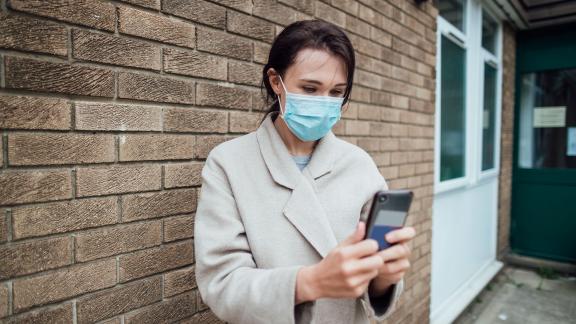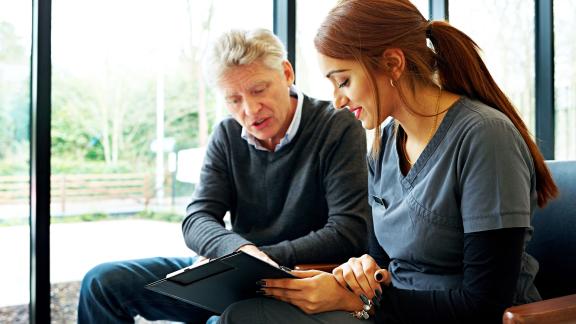Digital skills in mental health guide: an interactive tool for teams to make progress together

About this guide
This is a practical guide for people working in mental health to help you build your digital confidence and skills. You can use the guide to consider where you are now, where you want to be and how to get there. The guide will help you understand your current confidence and skills and identify things you can do to improve. Leaders and managers can use the guide to support an open, supportive discussion with individuals and teams as a whole.
The guide provides a simple, interactive way of having a conversation with colleagues and identifying manageable steps forward that will make a difference to you, your team and service users. The guide looks at generic digital skills across the mental health workforce and signposts you to specific and in-depth resources and tools.
The first step is to carry out the team baseline that covers organisational tools, supporting others, security and safety and being digitally enabled. Get started by exploring which of these statements best describes you:
- Curious but not sure how to get started
- Having a go but nervous about getting it right
- Confident that I'm doing this well
- The person that others come to for help
Principles of this guide
1. Culture over tech
This is about learning and supporting each other. We know that tech within mental health services can be frustrating, but we try to overcome this.
2. Skills amnesty
It doesn’t matter where your skills and confidence are right now. This is a safe space to support each other to get started or take steps to improve.
3. Not everyone wants or needs to be a digital expert
We will support you get to whatever level is right for you and your role.
4. Digital to enhance not replace
Digital can help provide a more rounded experience but not at the expense of service user and team interaction.
5. Co-production
Mental health services and digital tools are improved when service users and staff are involved in their creation through co-production.
What is digital?
The term ‘digital’ can mean so many things to so many people.
In health and social care, digital means using digital technology and data to support health and wellbeing, service delivery and transformation to improve outcomes for people.
There are three main purposes:
- Supporting people to interact with health and care and to look after their health and wellbeing.
- Organising and providing services effectively, including supporting professionals delivering individual care.
- Creating intelligence for service improvement, innovation, research and precision medicine by making use of the enormous power of data and analysis.
Using digital technology and data to support health and wellbeing, service delivery and transformation
Digital approaches include:
- electronic health records
- online team working with colleagues and peers using virtual collaboration tools and virtual meetings
- electronic communications (e-communications)
- remote assessment, consultations, referrals and support
- digital therapies: standalone, blended with traditional therapies, online peer support and more advanced automated or semi-automated therapeutic tools
- smartphones as a platform, such as for sensors, social media or telemedicine
- monitoring equipment, including sensors and wearable devices
- the use of web- and cloud-based tools and apps to support clinical decision-making
- e-learning, education and training
- data collection and analytics.
However, we also think digital should also be seen as a way of doing things. A digital culture encourages people to look outward to users and other stakeholders to collaborate with others on developing new solutions, and to continuously learn. At its best, digital transformation changes the way work gets done by putting users and their needs at the heart of the process.
Digital transformation changes the way work gets done by putting users and their needs at the heart of the process
Digital can support:
- more systematic, high-quality care
- more proactive and targeted care
- better coordinated care and mobile working
- improved access to specialist expertise
- greater service user engagement
- improved resource management
- system improvement and learning. 1
Mental health trusts are developing strategies to deliver local priorities and the capabilities that NHS England and NHS Improvement has prioritised:
- Digital options for accessing care, including online referrals, and an updated nhs.uk hosted local service directory, which includes signposting to crisis services, by 2021.
- Supporting digital clinical monitoring, by 2023.
- Making use of tools to support clinical decision-making, including identification of need, assessment, detection of risk (such as crisis) and treatment selection, by 2023/24.
- Offering a range of self-management apps, digital consultations and digitally-enabled models of therapy to support access to psychological therapies in IAPT, first episode psychosis services, eating disorder services, CMHTs and Children and Young People's Mental Health Service by 2023/24. Options should be accessible to all, including women during the perinatal period and older adults. 2
On a practical day-to-day basis it means you, your colleagues and your service users using devices such as computers, smartphones and tablets, and software such as websites, apps and platforms. On a strategic basis, it means working with service users and others to create new approaches that meet their needs.
What skills do your team have now (managers)
How to use this section
This section is designed to help you and your team to identify a baseline of where you are currently with digital skills and confidence, where you want or need to be, and how to get there.
By providing honest answers about where you feel you are, you and your team members can be supported to grow your confidence if that's right for your roles.
- Everyone in the team uses this section to find out where they are. They may find it useful to make a personal note of practical examples to help test out their own assessment.
- The team reviews all their results together, looking out for where people have particular passions and skill sets, and where there are barriers or where progress needs to be made. Encourage sharing across the team so you have a picture of where you are collectively.
- The team uses the section content to find ideas that help people make progress from one level to the next.
- The team makes practical plans for how to best use existing skills within the team (for example identifying how colleagues can buddy up to support one another) and what additional training or resources might be needed.
- The group uses this section again after about six months to see how things are going, share progress and identify new gaps and update their plans.
The framework
Click on the themes below to see if you are:
- Curious but not sure how to get started
- Having a go but nervous about getting it right
- Confident I’m going this well
- The person who others come to for help
Hints and tips
Here we look at examples of how people in similar roles as you have been able to improve their skills.
Choose the area of digital that you would like find out more about from the list and see how colleagues changed how they work with digital.
You can also find out more tips by searching #MHDigiTips on Twitter, where colleagues will be posting videos of tips that they use every day.
Internal systems: using the digital tools that are already in your organisation
Supporting others: (service users, colleagues and others) to use digital tools
Digital security and safety: protecting people’s data by taking precautions
Do you have a hint or tip for colleagues? Tell us your story
Being digitally engaged: embracing ways in which digital can benefit you and others
Co-production of digital services: the process of involving service users in the design of digital services
Do you have a hint or tip for colleagues? Tell us your story.
Do you have a hint or tip for a colleague? Tell us your story
Colleagues have told us that they prefer to hear about real stories and experiences from people like them. If you have a hint or tip to share, then there are two ways to do that:
- If you want to tell us your story, like those above, of how you have improved your skills and what that has meant for you in your role, then please fill out this form so we can grow the library
- If you have any tips or helpful hints that might help others, then please follow the guidance below and upload a video to Twitter using #MHDigiTips.
Video guidance
- You will need a Twitter account and either a laptop or smartphone.
- You must be GDPR compliant. If you are showing a tip on a platform then make sure there is no patient or colleague data visible.
- This isn't meant to be a Hollywood production. We are just looking for quick tips from the people who know best.
If you want to do a video of just you talking about a hint or tip:
- Turn your smartphone on to selfie mode and press record
- Introduce yourself and your job role
- Tell us the tip and make sure you tell us what platform the tip is for (e.g. Microsoft Teams) if applicable
- Try and keep the video to no more than 60 seconds long. (Don't worry if you go slightly over)
- Write a tweet including #MHDigiTips in your text. E.g. 'Here's a tip for all mental health professionals when using Attend Anywhere. #MHDigiTips
- Go to your photo library (in the bottom left hand corner)
- Find the correct video and click on it.
- Send the tweet
If you want to do a video of you demonstrating something on an actual digital platform
- Open the digital product that you are going to use in the demonstration, making sure no identifiable data is showing
- Open the video software that you normally use to have virtual meetings with colleagues (probably Microsoft Teams or Zoom)
- Click on the share screen icon and choose the tab screen which has your demonstration platform ready
- Press the record button on MS Teams or Zoom
- Introduce yourself and your role and tell us what you are going to show us
- Take us through the demonstration
- End recording and download the video
- Try and keep the video to no more than 60 seconds long, (Don't worry if you go slightly over)
- Write a tweet including #MHDigiTips in your text. E.g. 'Here's a tip for all mental health professionals when using Attend Anywhere. #MHDigiTips
- Go to your photo library (in the bottom left hand corner)
- Find the correct video and click on it.
- Send the tweet
Acknowledgements
This guide was commissioned by the Mental Health Network and developed by mHabitat.
Thank you to staff and associates of mHabitat for co-producing this guide:
- Roz Davies
- Sanah Ali
- Pete Nuckley
- Lucie Stephens
- Helen Bradburn
- Sarah Alden
From mHabitat: “We would like to thank everyone who co-designed this guide with us, we couldn’t have done it without you. In particular we would like to thank:
- Alex Stewart at Mental Health Network, NHS Confederation
Steering group members
- Dr James Woollard
- Phil Hough
- Dr Ayesha Rahim
- Henrietta Mbeah-Bankas
- Sue Sibbald
- Dr Anish Nrk
- Matt Butler
- Dr Girish Vaidya
- Emma Paveley
- Dr Jane Padmore
- Duncan Tree
"All of the mental health colleagues who gave their time to let us know what they need and how to make this guide impactful."



